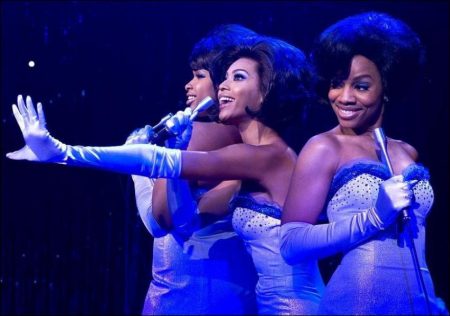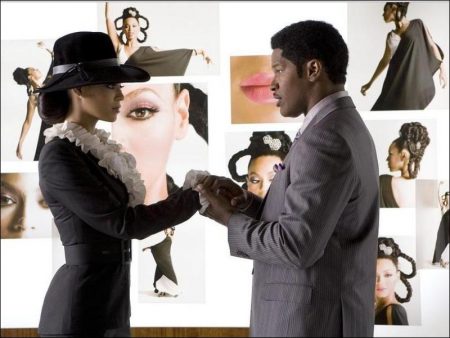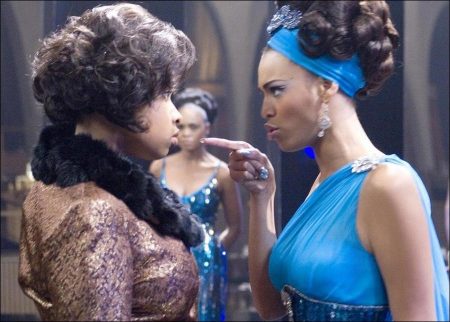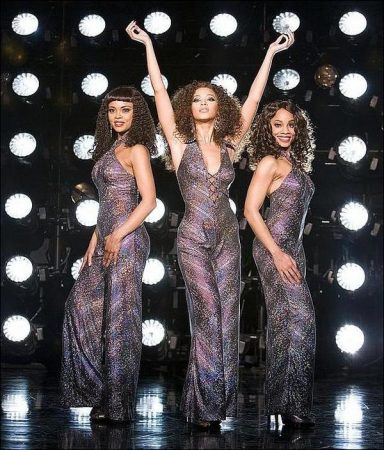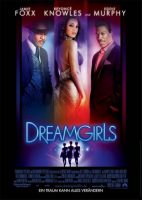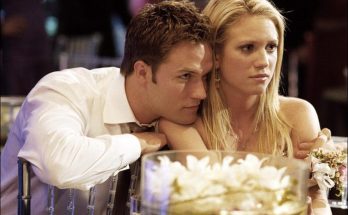Tagline: All You Have To Do Is Dream.
Dreamgirls movie storyline. Based on the award-winning hit Broadway musical about a female singing group called the Dreamettes. In 1960s Detroit, a good night onstage can get you noticed but it won’t get your song played on the radio. Here, a new kind of music is on the cusp of being born – a sound with roots buried deep in the soul of Detroit itself, where songs are about more than what’s on the surface, and everyone is bound together by a shared dream.
Curtis Taylor, Jr. (Jamie Foxx) is a car salesman aching to make his mark in the music business – to form his own record label and get its sound heard on mainstream radio at a time when civil rights are still only a whisper in the streets. He just needs the angle, the right talent, the right product to sell.
Late for their stint in a local talent show, The Dreamettes – Deena Jones (Beyoncé Knowles), Lorrell Robinson (Anika Noni Rose), and lead singer Effie White (Jennifer Hudson) – show up in their cheap wigs and homemade dresses, rehearsing songs and steps by Effie’s brother, C.C. (Keith Robinson), with hopes that talent and sheer desire will break them out of the only life that seems available to them.
They’re young. They’re beautiful. They’re just what Curtis is looking for. All they have to do is trust him. James “Thunder” Early (Eddie Murphy) is a pioneer of the new Detroit sound, spellbinding audiences all along the “Chitlin’ Circuit” with his electrifying blend of soul and rock ‘n’ roll. Curtis finesses The Dreamettes a gig singing backup for Early, and suddenly, for all of them, the gulf between what they want and what they can have draws closer for the first time.
Curtis launches the girls as a solo act, rechristening them The Dreams, knowing in his gut that success lies not with the soulful voice of Effie, but with the demure beauty and malleable style of Deena – despite their history…and Curtis’ promises. Deena is ready to step into the spotlight, even as Effie fades away. As a new musical age dawns, Curtis’ driving ambition pushes this one-time family to the forefront of an industry in the throes of music revolution. But when the lights come up and the curtains part, they hardly recognize who they’ve become. Their dreams are finally there for the taking, but at a price that may be too heavy for their hearts to bear.
The groundbreaking Tony Award-winning Broadway phenomenon comes to life as an all-new motion picture adaptation written and directed by Academy Award winner Bill Condon. A Laurence Mark production presented by DreamWorks Pictures and Paramount Pictures, “Dreamgirls,” is a compelling story of love and loyalty, fame and betrayal that tracks the struggle, sacrifices and triumphs of a group of outsiders carrying their landmark sound into mainstream America in the 1960s and ’70s.
The film features a stellar ensemble of acclaimed talent led by Oscar winner Jamie Foxx (“Ray”); recording superstar and actress Beyoncé Knowles (“The Pink Panther”); and four-time Golden Globe nominee Eddie Murphy (“The Nutty Professor,” “Beverly Hills Cop,” “Trading Places,” “48 Hrs.”). The film introduces Jennifer Hudson, who came to worldwide recognition as a finalist on the hit series “American Idol.” Also starring are screen legend Danny Glover (“Lethal Weapon”), Tony Award winner Anika Noni Rose ( “Caroline, or Change”), Keith Robinson (“Over There”), Sharon Leal (“Boston Public”) and three-time Tony Award winner Hinton Battle (“The Tap Dance Kid,” “Miss Saigon,” and “Sophisticated Ladies”), who also appeared in the original Broadway production of “Dreamgirls.”
Bringing the Legend to Life
“I’m not the dream that you had before. I’m the dream that will give you more and more.”
“Dreamgirls” was an anomaly when it came to life on the Broadway stage in the early 1980s directed by Michael Bennett. While visually the play was unlike anything ever attempted on Broadway, it was the intense human drama and moving, showstopping songs that redefined musical theater for the era. “There is something primal about musicals,” says writer-director Bill Condon, who was galvanized as he sat in the back row with some friends on opening night. “They can get under your skin in a way that straight dramas can’t. In “Dreamgirls,” the emotions bleeding through the songs made it a profoundly affecting experience.”
Tom Eyen and Henry Krieger’s earthy fable about real emotions – love, ambition, anguish, passion – deeply resonated with a vast cross-section of people. “We all know what it’s like to desperately want something we can’t have,” Condon continues. “We all know what it’s like to be left behind. Or to sacrifice everything for something you think you want, only to realize too late what you’ve lost. Here, in these characters, was all the hope and anguish laid bare. It’s what has stayed with me all these years later, and what I wanted to bring back to life in this film.”
“The themes of this story seem to be even more relevant today than they were twenty-five years ago,” notes producer Laurence Mark. “What are the gains and losses that accompany fame? What are the consequences if you don’t compromise? What are the consequences if you do? Is talent something to be packaged and sold? And finally, in the quest to hang on to your dreams, how can you also hang on to yourself?”
The setting is the Motor City, where African-American music is on the verge of breaking down the doors of the mainstream American music scene. “This story takes place in the ’60s and ’70s, which was a period of vast social and political change,” says Condon. “The characters in ‘Dreamgirls’ reflect that upheaval.”
Not only was music in transition, but so was the country. “This film takes place in a very unique time in history, the beginning of the urbanization of music,” adds cast member Danny Glover. “The rise of the Civil Rights movement was bringing segregation to its end. The focus was shifting to the urban centers in the country.”
The story finds one man trying to break in at that precise moment. Jamie Foxx, who won the Academy Award® for his portrayal of Ray Charles in “Ray,” in addition to being nominated for Best Supporting Actor for “Collateral,” plays Curtis Taylor, Jr., a hungry young businessman who sells Cadillacs as a springboard to a bright future he feels destined for. “Curtis is a rough-edged kind of guy who is trying to get into the music business,” says Foxx. “He just wishes that he could have sung better, could have written better music, could have played some type of instrument, but he can’t. So, he does what he can to get to the top by managing talent. I think that comes with a curse for him – on some level, he wishes it was him out there. He’s working every angle until he finds an opening.”
With “girl groups” sprouting up from gospel choirs across the country, talent night at the local club proves to be a goldmine. “Curtis is everywhere, putting things together,” says Condon. He finds his vehicle when he sets his eyes on The Dreamettes.
“They are three hungry, excited, anxious, naïve girls,” says Beyoncé Knowles. The Platinum-selling musical artist stars as Deena Jones, a role she was told at the tender age of 16 that she was born to play. “It’s so exciting for them to be there because they want this so bad. They want to be in the music industry. Their futures are entirely in front of them, and they think they’ve got what it takes to make it. When Curtis sees them, he sees all that potential.”
Beautiful but circumspect, Deena’s soft voice belies her ambition and competitive nature. “She’s the hustler,” Knowles describes. “She wants to get them onstage. They’re ready for this. It’s what they’ve been rehearsing so hard for. Their whole lives have led up to this moment.”
The group’s lead singer, Effie White, is played by newcomer Jennifer Hudson. Not as refined as Deena and Lorrell, Effie is a young singer who, despite her immense talent, does not fit the mold of an up-and-coming star in the ’60s. “Effie shows up in her fake leopard skin coat with her head held high,” says Hudson. “She knows she’s got the voice to be a great singer. But she’s also heart-breakingly naïve. She has this swagger -surrounded by her girls, her friends and back-up singers. She’s really not prepared for what’s about to happen to them. None of them really are.”
The filmmakers conducted a six-month search, seeing more than 780 women to find the right combination of strength, passion and vulnerability to embody the character that made a young gospel singer named Jennifer Holliday a household name in the 1980s. “We held open auditions in Chicago, Detroit, New York, Atlanta, St. Louis, and here in L.A.,” recalls casting director Debra Zane. “The role of Effie is so important; she’s basically the heart of the movie. It was critical that we find exactly the right person to play this role.”
Out of all the talented young women who were called, “American Idol” finalist Hudson stood out. “I stood on the ‘American Idol’ stage and then was the one to leave,” she says. “I was okay with it because I knew it wasn’t my dream. I knew my dream was coming – and here it is. In a way, I’m like Effie – on that kind of rollercoaster and coming out of it with a deeper understanding of myself and my art.”
Third in the group, singing back-up, is Lorrell Robinson, played by Tony Awardwinning Broadway actress Anika Noni Rose. Rose sees her role as “the peacemaker in the group. When things go awry, she’s the one who wants to pull it together and make it work, because these are her friends.”
Lorrell is barely able to contain her excitement at their luck when Curtis puts The Dreamettes together with singing sensation and local celebrity James “Thunder” Early. “She is like a lamb to the slaughter,” says Rose. “Here is this incredible man who to her is just the world’s greatest superstar. Lorrell can’t believe their luck.”
Eddie Murphy, whose prodigious talent fueled his own meteoric rise on television in “Saturday Night Live” and films like “48 Hrs.” and “Trading Places,” plays James “Thunder” Early, a character Condon describes as “a force of nature. Nothing can hold him back when he’s performing and that electric energy bleeds into his personal life.”
For Murphy, Early represents the unique R&B spirit that was even then bleeding over into the consciousness of mainstream America. “Jimmy is perpetually on the edge of getting some national exposure, playing the cities,” says Murphy. “Everyone loves him because he’s really one of a kind. He just can’t seem to break through, but he is an R&B originator, bringing the sound that white kids could dance to – like James Brown, Chuck Berry, Little Richard. While the country was still segregated, they were bridging the world of music, bringing ‘black’ sound to ‘white’ America. It wasn’t until later that these performers realized just how much they accomplished.”
As they aggressively tour the “Chitlin’ Circuit,” Effie’s brother C.C. (Keith Robinson) writes songs and choreographs moves for the parallel acts. C.C., though quiet, is the ideal conduit through which Curtis can craft the artists into a marketable commodity. “C.C. is a gifted artist in his own right but he doesn’t have the confidence to express what’s really in his heart,” says Robinson. “Like everybody else in their little group, he puts his trust in Curtis. And through his songwriting, he becomes this instrument, a tool Curtis uses to take on the roadblocks he wants to break through.”
“They’re all coming up together and it’s so exciting,” says Rose. “There’s this sense of camaraderie and shared desire. Everything is fun. Everything is an experiment. The stakes are high but it’s all really in the abstract – they’re still in their own little world. This is a time when no one has crossed over. So, they can afford to experiment.”
The more they’re together, the closer Effie and Curtis become. “Curtis is Effie’s first love,” says Condon. “Though gifted musically, she is still basically just a kid. Curtis is captivated by her sweet face and big voice. He’s drawn to her talent.”
When Curtis mixes with James “Thunder” Early, promising to break him out of the Chitlin’ Circuit and into more uptown bookings, his longtime manager begins to see that the game has changed. Independent Spirit Award winner and acting legend Danny Glover plays Marty. Foxx enthuses, “Working alongside Danny, who is one of my heroes, is just incredible.”
“Marty is an old school talent manager,” describes Glover. “He discovered James when he was a kid, so he’s like a father figure to him. But he’s also that generation of talent agents who are on their way out. Marty has a real integrity, but he is not able to move up to another level. Curtis can see the transformation coming and asserts himself within that transformation. He takes the nurturing business relationship that James had with Marty, and turns it into a purely business relationship.”
Unable to break through the payola-dominated landscape of mainstream radio, Curtis makes a play for breaking in on his own terms, rather than handing everything over to white artists and promoters. “Curtis is a guy with a vision that African-American music can cross over to a broader white audience,” Condon explains. “And he’ll do whatever it takes to get there.”
Marty becomes the first casualty of Curtis’s hunger to reach the next rung in the ladder, and ruthless methods for getting there. “What Marty sells is not disposable,” comments Glover. “It’s an essence of something. What Curtis wants to sell is a commodity, an object. It’s the object he’s trying to sell, not the person.”
Curtis reinvents Early as a soft-toned crooner – not the carnal roadhouse lothario with the explosive voice – to play before society types in the Miami clubs. “But James ‘Thunder’ Early is too much a force of nature to fit into this box that Curtis wants him in,” says Condon. “Curtis can’t break down Jimmy’s rough edges. He can’t change who and what he is.”
Condon saw Eddie Murphy as flamboyant R&B star James “Thunder” Early even as he was adapting the screenplay. “I had Eddie Murphy in mind to play James Early from the beginning,” Condon remembers. “Fortunately, like me, Eddie had seen the original ‘Dreamgirls’ several times. And he loved the challenge of doing something that doesn’t connect to anything he’s done before.”
“Eddie took the biggest risk,” adds Mark, “and he really went for it, aiming for the rafters.”
“Eddie’s the type of guy that can really do it all,” notes Foxx. “His acting, his stand-up. All that talent. Then, he comes in here and goes into his song and dance number, it’s incredible. You know you’re working with great talent.” Adds Knowles, “Look out when Eddie Murphy takes the stage. He rocks in everything he does. The middle name in his character, ‘Thunder,’ really doesn’t do justice to describing his energy and the effect he has on an audience.”
Curtis next sets his sights on The Dreamettes and goes with his gut – Deena, the prettiest one, the one with the softest voice, is the way into the living rooms of mainstream America. Says Condon, “He will groom them into this very sedate and sophisticated girl group. He reinvents them as The Dreams…but that involves putting Effie in the background. It happens in the blink of an eye. And just like that, Effie’s dreams are obliterated.”
Condon rolled cameras on Effie’s character-defining song, “And I Am Telling You I’m Not Going,” during the final four days of principal photography, which allowed Hudson to completely inhabit the character of Effie before immortalizing her watershed moment in the story. “Effie is shocked, and she feels betrayed,” says Hudson. “‘And I Am Telling You’ is about her heart and soul being laid out on the line. She’s rejected by her family. They have all traded her in for something else. But she will not go quietly.”
“In ‘And I Am Telling You,’ Effie is plaintively and desperately addressing Curtis, her lover,” says Condon. “What she’s trying to make him hear is not just the words to the song, but her voice – which is really the essence of who she is. Everything about the song, including how it affects us, the audience, is an integral part of the experience of this story.”
Effie acts out, showing up late for rehearsals, disrupting recording sessions, not letting them forget the pain she’s in. What they call success to Effie looks like one long compromise. “So she goes home,” says Condon, “back to Detroit. She goes through her own transformation, treading an unexpected path, and suddenly a greater clarity about who she is and what she wants reveals itself.”
Curtis has already replaced her with a young singer who has gotten her foot in the door by taking a secretarial job at Curtis’s Rainbow Records. “She’s a quick replacement for Effie when Curtis finally decides to get rid of her,” says Condon. Michelle, played by Sharon Leal, becomes the fourth Dream and soon falls for their underappreciated songwriter and choreographer, C.C. “Michelle is pursuing her own dreams,” says Leal, “when she walks in on all this drama.”
Deena has everything it takes to cross over, but the woman who turns everything she touches to gold, and the one she sees when she looks in the mirror, are no longer the same person. “Curtis is obsessed with Deena, in part because she is his creation,” says Condon. “He sees her as an image that he’s packaging to the world.”
Curtis sees Deena “as a product, a can of Coke,” says Foxx. “He’s willing to do anything to keep the music marketable, as opposed to really finding out what her sensibilities and her emotions are all about. Success is an exercise in compromise.”
Having grown up in a singing group before emerging into her own spotlight, “Beyoncé has lived some of Deena Jones’s story already,” says Condon. “She was born to play this role and understands it intuitively.”
“It took a great deal of skill on Beyoncé’s part for her to turn into Deena Jones,” observes Mark, “for her not to pull focus in the first section of the movie and to be a singer very different from herself throughout.”
To physically embody Deena’s transformation, Knowles utilized only a percentage of her voice and downplayed her cover girl looks until the time came for Deena to step into the limelight. “Because Deena’s performance style is so different from my style, I had to hold back, to remind myself, ‘Don’t sing it in full voice, sing it like Deena.’ She is all about subtleties—she’s very feminine and sexy, in a subtle, slightly mysterious way,” observes Knowles.
“Later, you see her growth,” says Condon. “You see that she’s more than just a naïve girl from Detroit. When she gets onstage, something very sexy happens. “People are going to be very shocked,” adds Beyoncé, “because I know they might be expecting Beyoncé,’ but Beyoncé is nowhere in this movie.”
Deena’s star rises because Curtis’ instincts are right on target. “The thing about Curtis is that he’s almost always right about things,” says Condon. “And what he wants to do — break through racial barriers to get black talent heard and seen – is heroic. But the more successful he becomes, the more brutal he is in his disregard for the dreams of the people around him.
“Curtis is someone who is addicted to dreams,” Condon continues. “As soon as he accomplishes one thing, he’s on to the next.”
“When people think of dreams,” says Beyoncé Knowles, “they only think of beautiful, shiny things. They don’t think about sacrifice and the price you pay to gain success and accomplish those dreams. There are so many complicated things that come along in life. And we touch on all of those things. But, ultimately, it’s about getting those dreams…and for many of us, making ‘Dreamgirls’ was a dream.”
Condon infused the cast with two vital performers who appeared in the Broadway play a quarter century ago. Hinton Battle played James “Thunder” Early in the production as a summer replacement, taking over the role from its originator.
“’Dreamgirls’ is special because it is truth; it is reality,” says Battle. “It really tells the story of how things were, the struggle of the record industry, with payola and how white recording artists were taking songs from black artists and making them hits. Ultimately, though, it’s a story of passion and love and all the great things we yearn for. The film has an ability to reflect on the past, but also comment on the future by dealing with where African-American music is in today’s culture. That’s what makes it even more relevant today.”
In another nod to the original Broadway production, Loretta Devine—who originated the stage role of Lorrell—appears in the film as a jazz diva. “At the time when we were doing ‘Dreamgirls’ onstage, we had no idea what we were creating and how important it would be 25 years later,” muses Devine, who feels Condon’s expanded storytelling will bring in a whole new audience. “The music is like opera. People respond to it because it’s fabulous—it’s beautiful; it’s fashion; it’s passion; it’s talent; it’s heart. And it has this great story, about love and about sisterhood.”
Orpheum Theatre Event Generic
NOT even the wettest day of the year in Los Angeles could dampen the spirit of Beyonce Knowles as she strutted her stuff for Dreamgirls, which is being billed as the most exciting movie musical in ages.
As the downpour flooded Downtown Los Angeles, turned streets into canals and rain battered a constant rhythm on the roof of the city’s Orpheum Theatre, the chart topping pop star was at her sizzling best.
Looking absolutely sensational in a shimmering, figure hugging red dress and wearing a wig that gave her a Mary Quant style 1960s bob, Beyonce set the stage alight.
She was joined in the knockout musical routine by American Idol finalist Jennifer Hudson and Broadway star Anika Noni Rose as they acted out the role of girl group The Dreamettes.
The girls belted out a heart stopping rendition of Step Into The Bad Side as a specially invited audience of international journalists got a tantalising taste of this hotly anticipated movie musical.
This was the first glimpse that anyone had seen of Dreamgirls, the big screen version of the musical that won an amazing 13 Tony Awards after it was first staged on Broadway in 1981.
Amazingly it has taken 25 years for Hollywood – in the shape of studios Paramount and DreamWorks – to bring this award winning musical, which is a thinly disguised look at the story of girl group, The Supremes – to the big screen.
And now that the cameras are finally rolling, Beyonce – whose movies include the current re-make of The Pink Panther, Austin Powers In Goldmember and The Fighting Temptations – says that starring in DreamGirls is the big screen highlight of her career.
“It was my dream to be in this film, I wanted it bad,” says the star who studied footage of all the Tamla Motown legends before beginning the arduous preparation and shooting schedule. “I looked at everything The Supremes and Martha Reeves did, then we rehearsed for two months before we started filming and I prepared for two months before that.”
Beyonce is part of an all-star cast because Dreamgirls also features Eddie Murphy, Oscar winner Jamie Foxx and Lethal Weapon star Danny Glover. All the stars are excited by this multi-million dollar movie, which will be released at the beginning of 2007. Jamie Foxx, who was Ray Charles in the Oscar winning Ray, is convinced it’ll be a smash hit. “Sometimes it’s hard to take a stage play and turn it into a movie but this movie is going to knock your socks off,” says Jamie.
Director Bill Condon – whose previous films include Gods And Monsters and Kinsey and who wrote the screenplay for the Oscar winning musical, Chicago – has been a fan of Dreamgirls from the moment he saw the original stage musical. “I was lucky enough to be sitting in the last row on opening night and it was a night I’ll never forget,” says Condon. “The original Broadway production was thrilling and now I think it’s possible to take a fresh look at the material.”
Ever since Dreamgirls became a stage sensation there has been talk of a film version. But nothing ever happened till now. Things only started to heat up after Bill Condon had a conversation with a producer friend at a Christmas party. `It was right after Chicago opened and we talked about the possibility of doing a Dreamgirls movie,” says Condon.
The producer quickly moved into action and called David Geffen, the producer of the stage show, with a proposal that would transform the award-winning show into a film. Initially Geffen was not persuaded but eventually he agreed that the time was right to make a movie version of Dreamgirls.
Over the years since Dreamgirls was a stage success, Geffen had been in regular conversation with Henry Krieger, the composer of the musical. Krieger says he never doubted that there would be a Dreamgirls movie. And he adds that this confidence was aided by the fact that David Geffen had left him in no doubt that the film would happen at some point when all the essential factors were in place.
“I knew he’d pick the right time and the right people to do it…and he did. He picked Bill Condon and you can’t get better than that. Bill and I first met for lunch to discuss the project and we have become close friends; working with him has been a collaboration that has become the answer to a prayer.”
Since the film was green lit Krieger has been busy writing a whole bunch of new songs for Dreamgirls. “I wrote four new songs and extended some of the existing numbers to accommodate the vision of Bill Condon,” he says.
Another vital member of the team assembled by Bill Condon is choreographer Fatima Robinson, who was signed up after a nation-wide search. “We found 20 choreographers and asked six of them to do a presentation for the number Step Into The Bad Side,” says Condon.
That was when Fatima Robinson put her best foot forward. “I had three days to do my presentation,” says a smiling Fatima. “And at the end of it, Bill Condon was so good about it…we bonded there and then and ever since this has been a great experience.”
Fatima was one of the film team who was starting from scratch. “I have not seen the stage show,” she says. “So I really went off how the music moved me. I just did what I felt was right for the music.”
Her instincts were spot on. For instance as she created her choreography for Step Into The Bad side Fatima decided on the use of tambourines to emphasise the gospel element of the music. It was a move that instantly earned her the approval of Henry Krieger.
“When Henry saw how I had choreographed that number he said…’Finally someone gets the gospel sound!’…It was great for the composer to say that.”
Part of her role was to teach Beyonce how to dance like the Motown stars of the 1960s. “I’d tell her not to move her waist or shake her bottom but to dance from the shoulders, they way they did back then,” says Fatima.
Naturally Fatima’s homework meant watching tapes of acts like Diana Ross and The Supremes and The Jackson 5. She also drew on memories from her youth.
“I have two younger sisters and when we were growing up we would put on our mom’s heels and do routines like the Dreamgirls do. Now watching these routines for the movie reminds me of me and my two sisters.”
Henry Krieger is the last surviving member of the creative team that dreamed up Dreamgirls the stage phenomenon. “Yes, I’m the last leaf on the tree,” he says. “The other three have passed on and I hope they are looking down on this and smiling,” he says.
And the composer is thrilled that Beyonce is starring in the film. “She is a wonderment!,” gushes Krieger. “When I met her she was such a gracious person that I knew this would all go well.”
When he’s asked if he feels like the cat that got the cream, Krieger shakes his head. “No, I feel like a very humble and grateful man because I was asked to be a part of this,” he says. “I was invited to help develop it and I’ll always be grateful for that. I’ve had the best time anyone could ever have had.” – By John Millar
Dreamgirls (2006)
Directed by: Bill Condon
Starring: Jamie Foxx, Beyonce Knowles, Eddie Murphy, Danny Glover, Anika Noni Rose, Jennifer Hudson, Keith Robinson, Sharon Leal, Hinton Battle, Mariah Iman Wilson, Loretta Devine
Screenplay by: Bill Condon
Production Design by: John Myhre
Cinematography by: Tobias A. Schliessler
Film Editing by: Virginia Katz
Costume Design by: Sharen Davis
Set Decoration by: Nancy Haigh
Art Direction by: Tomas Voth
Music by: Tom Eyen, Henry Krieger
MPAA Rating: PG-13 for language, some sexuality and drug content.
Studio: DreamWorks Pictures
Release: December 25, 2006
Views: 105
